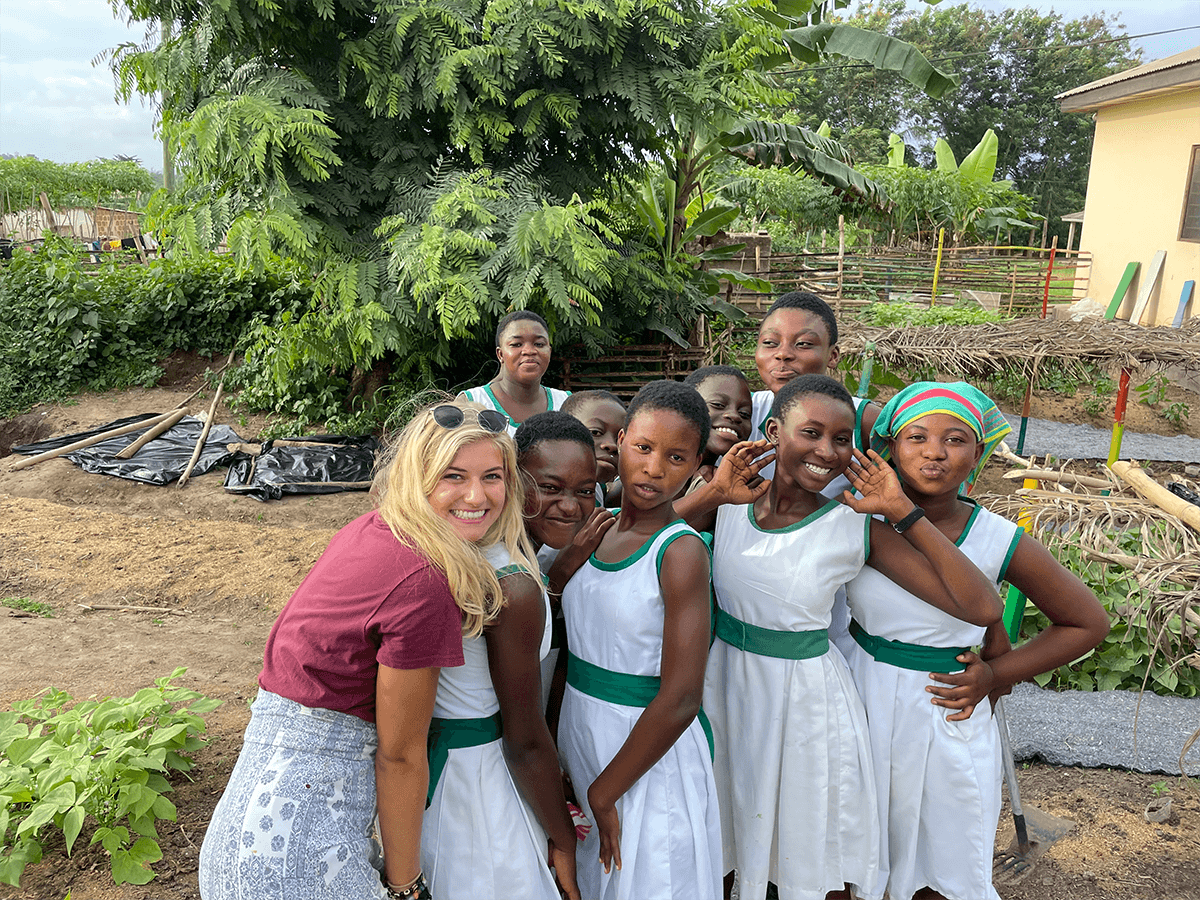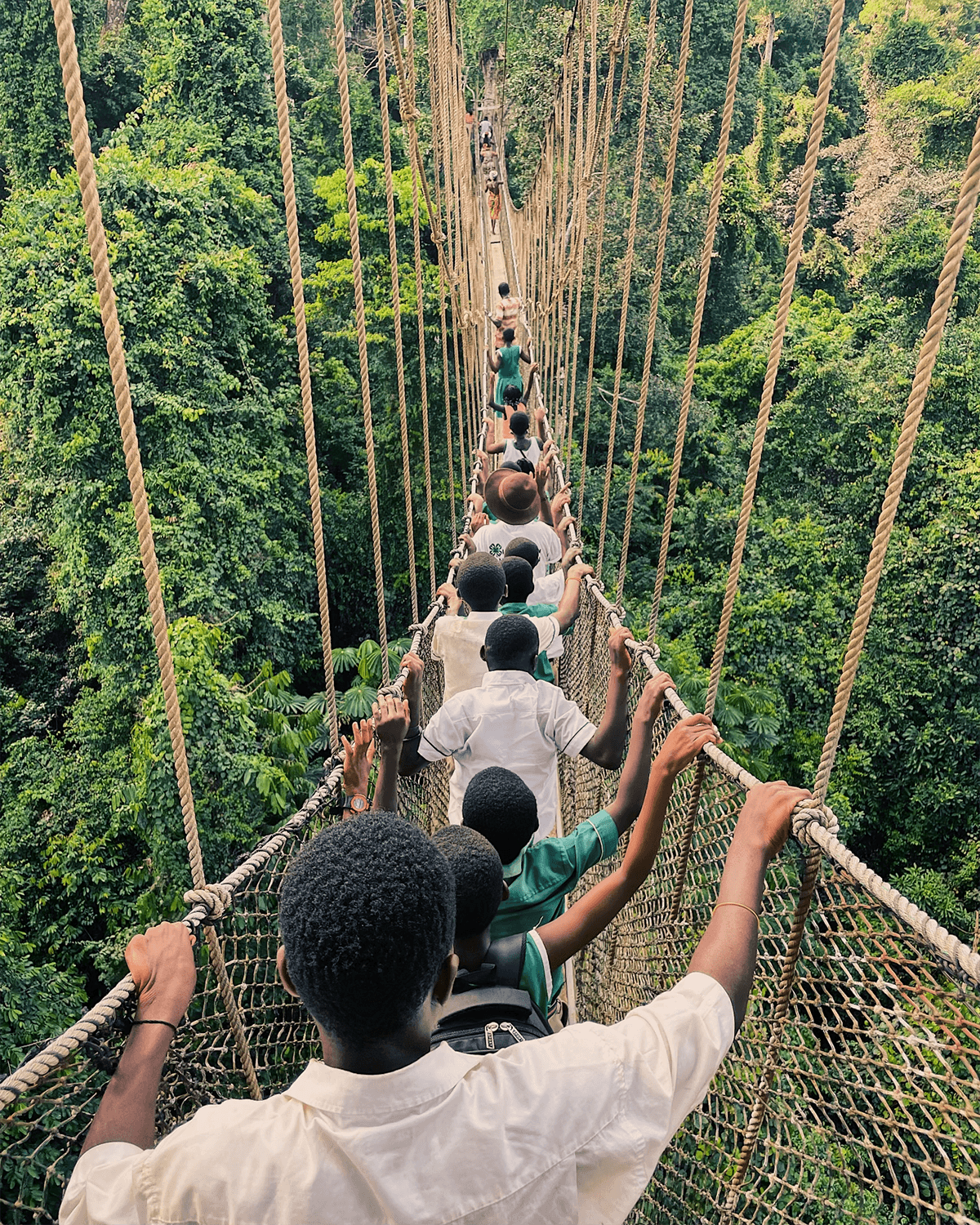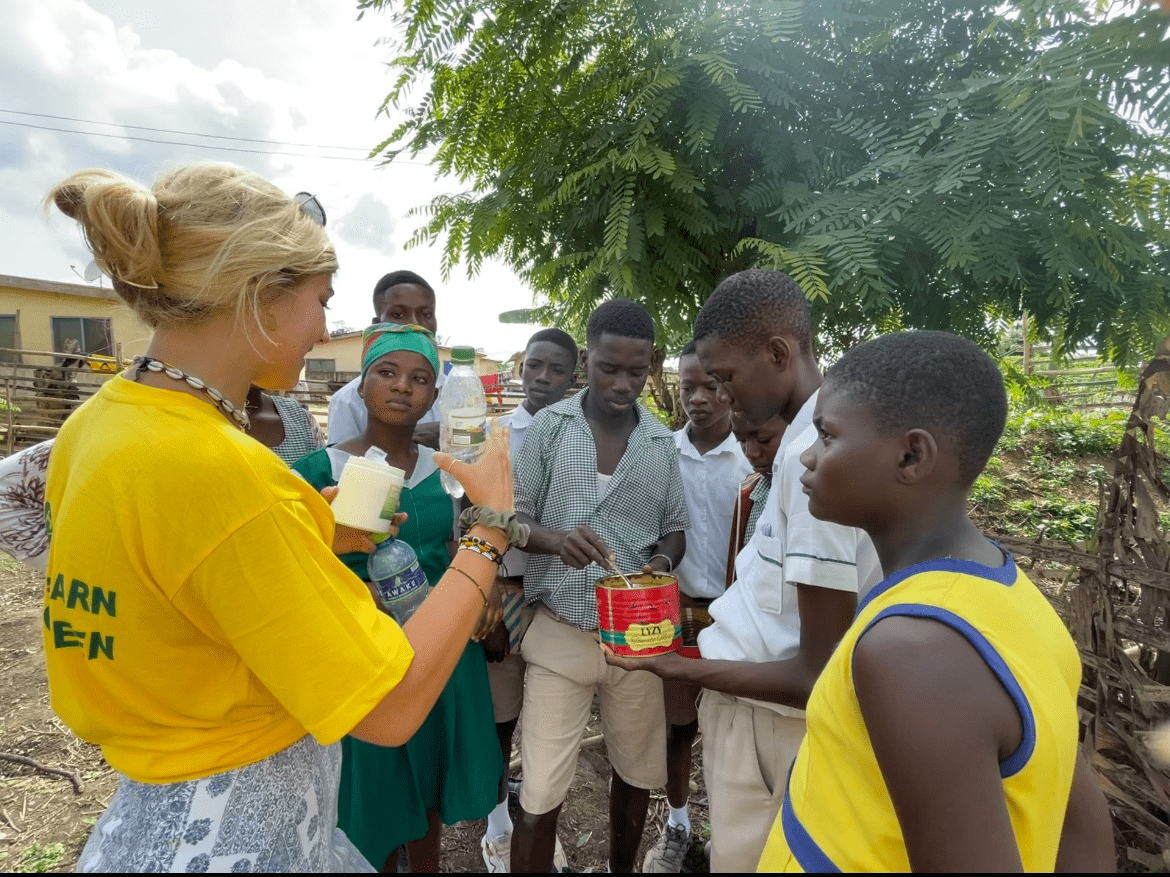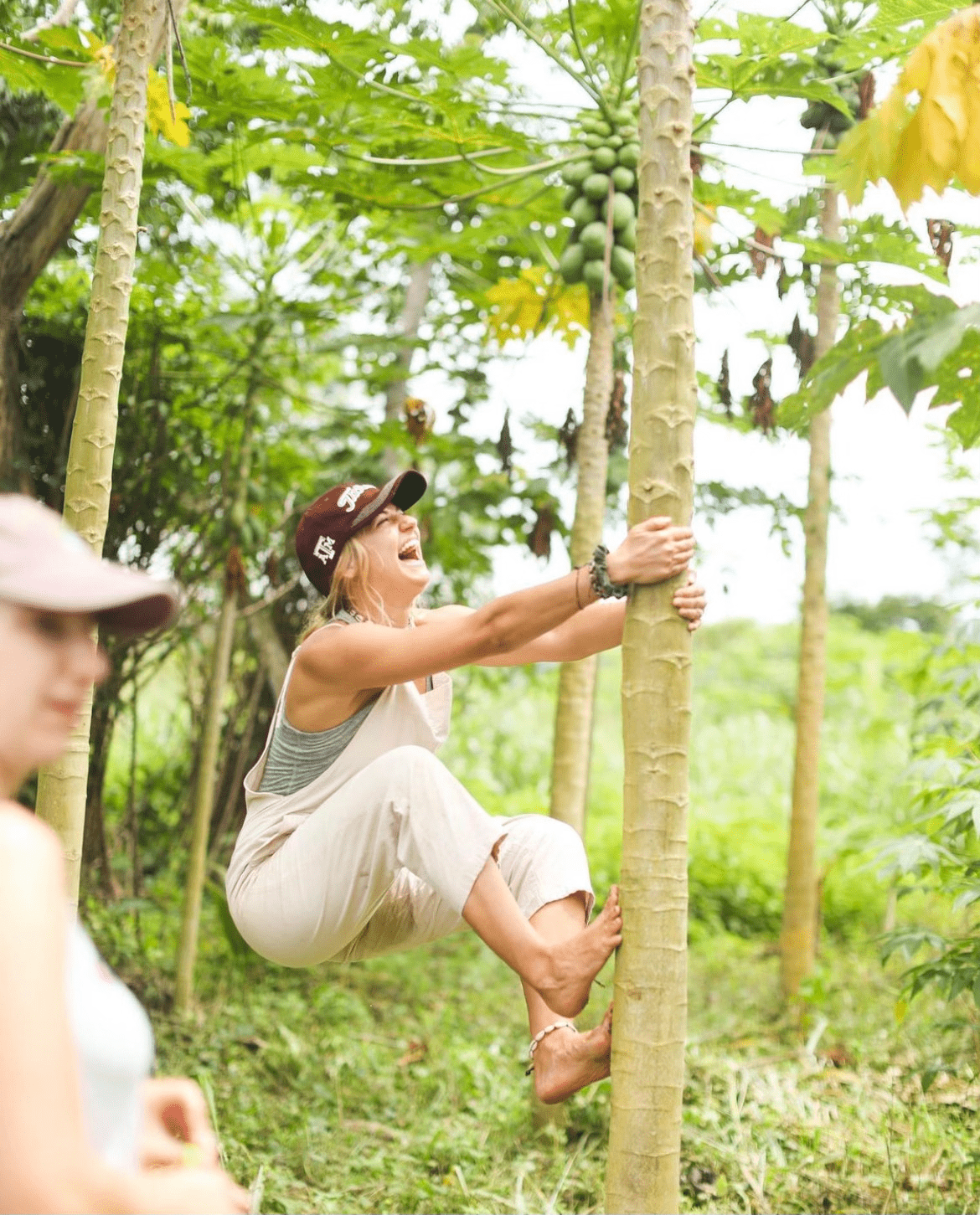Seeds of inspiration
Mary Michael Lipford has trekked across the world to joined the food insecurity fight in Africa, partnering with farmers and helping youth be empowered to grow their own food and be the best versions of themselves.
Mary Michael Lipford was at the local well in Ghana, filling up a bucket for the school garden when one of her students walked up to her. He asked Lipford why she is involved in agriculture.
“Do you know what dignity means?” Lipford asked the young boy.
The young boy said no.
“If you don’t have food — the basic level of dignity — you can’t do anything in life,” Lipford said.
The boy pondered for a second, before asking if he could study agriculture. Lipford ’21 had a Virginia Tech shirt on and excitedly pointed to it and said, “Yes! It’s something you can study. The University of Cape Coast down the road has a wonderful agriculture department and I promise you that I will take you to go see it before I leave.”
The inquisitive boy chatted with Lipford more about agriculture and by the end of the conversation, exclaimed that he, too, wanted to go down the same path.
Lipford has done many things in life, but none more edifying than accepting a position more than 5,100 miles from home in Ghana.
“It started with a seed of inspiration from Ozzie Abaye,” Lipford said. “I didn't go to Virginia Tech knowing that this is what I wanted to do. Ozzie got me excited about agriculture and the importance of going out into the world to work with others.”
In the College of Agriculture and Life Sciences, Lipford learned that without basic needs met, people can’t be the best versions of themselves.
“It all comes back to Virginia Tech. I’m only able to inspire my students because of how inspired I was by my professors,” said Lipford, a Richmond, Virginia, native.
Lipford is one of nine members of the first cohort of an effort to improve school-based agriculture education in Ghana, for the International Agricultural Education Fellowship Program run through The Norman Borlaug Institute for International Agriculture, a unit of Texas A&M AgriLife.
On her year-long mission, Lipford is helping the Borlaug Institute continue its namesake’s mission of elevating small-holder farmers around the world out of poverty and hunger through agricultural science – something that resonates deeply with her mission in life. “All my hope for the future of agriculture in Ghana lies in its youth,” Lipford said. “Youth are the catalyst for change because they are willing to take risks and try something new. This is the reason I am so proud to be a part of IAEFP’s mission to empower youth in agriculture because this is where I see lasting and meaningful impact. The youth already have everything they need within them. My job is just to bring that into the light.”
To fulfill that mission, she works with local schools and 4-H Ghana, one of the International Agricultural Education Fellowship Program’s partners. At the local school, Lipford has a cooperating teacher with whom she works daily.
There, she teaches classes and helps run the school’s 4-H club – all while inspiring the kids about the wonders of learning. “They love the hands-on aspect of agriculture,” Lipford said. “They want to learn and are excited about it. I see it on their faces every day. They all have the potential to do great things in life.”
One of the coolest things Lipford has experienced so far is that by giving the students the ability to be and think for themselves, a huge platform for learning opened and made them excited about their future.
Another perk? School attendance has gone up since Lipford has been inspiring her students.
“I’m just here to encourage the students in their communities,” she said. “They have all the potential in the world already inside of them. I just want to add a little bit of new excitement. They can take it from there and do amazing things.”
Lipford has seen some of those amazing things firsthand already when the teachers and students welcomed her with open arms. “I love the Ghanaian culture,” Lipford said with a smile that even a choppy Zoom call from the other side of the world call couldn’t hide. “The people are so welcoming and hospitable. They make it a priority to help the people around them no matter what they are doing. They will ditch anything to help someone else.”
A downpour from the heavens
The thunderstorms of the bush of West Africa are a different breed. They aren’t like anything in Virginia. You can feel their approach, ready to unleash a special kind of power.
Lipford felt one of those storms was on the horizon. She was on a field trip with her middle school kids, on a mission to bring back compost and sawdust for the school garden. Lipford felt adrenaline mix with a dose of fear. Fear that her kids might not come back to the 4-H club after this experience.
Thunder cracked overhead, causing Lipford to jump, after a white flash of lightning overhead. Rain pounded at the ground, whipping at everyone from the sides.
The smell of fresh rain mixed with compost and sawdust filled their nostrils as they held on in the back of a trailer that bounced over the pothole-filled road made of red clay.
Soon, it was more mud than road.
As they raced through town, water rushed through the streets. A branch slapped Lipford across the cheek.
Hope came to a halt when they got stuck in the deep mud.
“I’m responsible for this,” Lipford thought. “I hope that they’re having as much fun on this adventure as I am.”
Donning at least 100 bruises from the bouncing trailer, they slid to another halt. No, they weren’t stuck this time.
Lipford peered over the edge and saw an older lady of at least 80 standing there, trapped between villages.
Jump in, they shouted.
Lipford watched in amazement as an 80-year-old woman sat on top of 10 bags of compost and 20 bags of sawdust in a thunderstorm with four middle school boys, a white girl (herself), and Lipford’s cooperating teacher.
Agriculture isn’t always clean, but it is always an adventure.
When Lipford came to Virginia Tech, she wanted to join the fight against food insecurity in the world. That seemed like a daunting task until Lipford took a course with Ozzie Abaye, a professor in the School of Plant and Environmental Sciences.
“I heard her talk about her mung bean research and how she helps empower women,” Lipford said. “I immediately knew that’s what I wanted to do.”
What drives Lipford is fighting food insecurity. She wants to help people reliably grow their food.
For a society to grow, Lipford said, it needs to have its basic needs met: food, water, health, and education.
“If you can’t feed yourself, you can’t go anywhere or do anything,” she said.
To help another society meet those basic needs, Lipford traveled to Senegal with Abaye in June 2021 to assist with the utilization and implementation of mung beans in that region, simultaneously addressing malnutrition and food insecurity in Senegal. The introduction of mung beans into household farming systems is expected to result in health benefits and provide much-needed proteins and micronutrients, such as iron and zinc, often lacking in common starch-based diets.
"Seeing the years of research that Ozzie and others at Virginia Tech, Virginia Cooperative Extension, and partner Senegalese research institutes and universities be successful was incredible. "I'm fortunate to have even been a small part of this experience that has helped so many people."
To show what can be done with the mung bean, Lipford traveled to a village while in Senegal and helped hold a mung bean cooking competition in partnership with the USDA and Counterpart International, a global nonprofit organization.
Under hatch huts, the competition groups came with their own unique mung bean recipes. Along with a Virginia Tech apron, each of the groups received cooking supplies, such as whisks, bowls, and knives.
In the already blistering heat, more than 100 villagers gathered around piping hot coals to test out their mung bean recipes. As the mung beans simmered, the kids licked the bowls and whisks.
The mung bean passed that timeless test.
With the competition, the entire village saw that the mung bean fit into the staple foods already in their culture. “Seeing the years of research and outreach that Ozzie and others at Virginia Tech and Virginia Cooperative Extension be successful was incredible,” Lipford said. “I’m fortunate to have been even a small part of this experience that impacted so many people on another continent.”
Lipford was born and raised a Hokie. Her father attended Virginia Tech as a first-generation college student and some of Lipford’s earliest memories are of football games in matching cheerleading outfits with her older sisters.
Ever since Lipford first stepped on campus as a freshman, she felt the call to do international work. After a conversation with a friend, she was introduced to international agriculture.
She met Abaye soon after and declared her major.
“Ozzie is hands-down the most influential person in my experience at Virginia Tech,” Lipford said. “Just listening to her passions, her research in Senegal, and her work empowering women – that’s exactly what I wanted to do.”
Her changed her major to crop and soil environmental sciences with a minor in global food security and health – she kept her Spanish minor – and the rest is history. And she’s absolutely loved it.
For her work at Virginia Tech, Lipford received the Aspire! Award, which recognizes students, faculty, and staff who exemplify Student Affairs’ Aspirations for Student Learning. In addition to receiving numerous honors, awards, and scholarships, Lipford is also known for her roles outside of academics. She has been an Irish dance instructor, a member of the Student Life Council at Virginia Tech, a member of the Cru community, and an English as a second language tutor for the Virginia Tech Coalition for Refugee Resettlement.
Her work with Abaye came full circle when she made that trip to Senegal in June 2021. Lipford is just beginning to make her mark. “Food insecurity is driving me,” Lipford said. “I want to help feed people, but more importantly I want to empower people to grow their own food and know where it comes from. As a world society, the population is going to spike and we need to be prepared as a global community to face that.”
And that preparation starts with the youth of today, educating them through programs such as 4-H. Lipford made good on her promise to that young boy. In November 2021, she took him, along with the entire 4-H club, on their first field trip to the University of Cape Coast’s school farm. They loved it.



